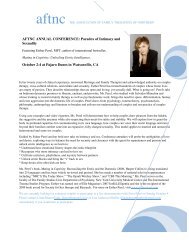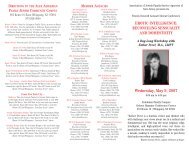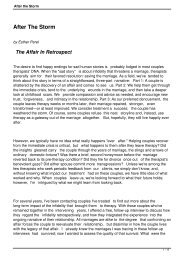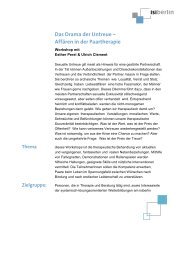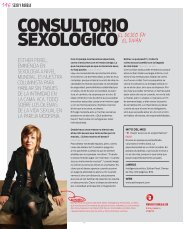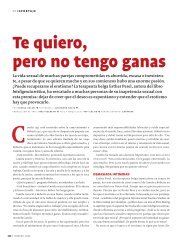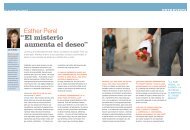The-Double-Flame 2.pdf - Esther Perel
The-Double-Flame 2.pdf - Esther Perel
The-Double-Flame 2.pdf - Esther Perel
Create successful ePaper yourself
Turn your PDF publications into a flip-book with our unique Google optimized e-Paper software.
<strong>The</strong> <strong>Double</strong> <strong>Flame</strong> 35<br />
Dismantling traditional gender roles takes a bit of psychological<br />
sleuthing, but little in one’s erotic imagination is happenstance.<br />
Alicia wants more play, not foreplay, an elaborate seduction, the<br />
“Juego,” as she calls it—a choreography of seduction that alternates<br />
between approach and retreat, meant to stoke the wanting. <strong>The</strong> subtext<br />
reads: “You think I am attracted to you and that you can just<br />
have me, but you’re wrong. You don’t have me yet. Now I distance<br />
myself, I’ll make you want me more. I come closer again and you<br />
think, this time, I got her. You’re wrong again. I move away once<br />
more. You come after me. <strong>The</strong> more persistently you pursue me, the<br />
more attractive and irresistible I feel, which makes me move away<br />
some more to see if you’ll keep coming after me, if I can make you<br />
want me even more.”<br />
Alicia tries to explain to Roberto that sex isn’t something that<br />
starts at 7:00 and ends at 8:00. It’s an attitude. Roberto replies that<br />
in the beginning Alicia didn’t need any of this. She too was direct,<br />
aggressive, and open to the raw edge of desire. She recognizes his<br />
description, but she’s in a different place now. Roberto is very open<br />
and willing—“I’ll try anything.” But rather than being receptive<br />
to Roberto’s openness, Alicia responds that she doesn’t like having<br />
to explain what she wants. I clarify that seduction isn’t only about<br />
flooding the other with your wanting, but rather eliciting their own<br />
wanting—to seduce is not to induce. Roberto is willing to venture<br />
outside his comfort zone, but Alicia needs to be responsive. When she<br />
redirects his advances, she has to curb her criticisms. She can guide<br />
him and then resent him for not knowing, or she can appreciate a<br />
new generation of men who invite being directed and don’t pretend<br />
to know.<br />
I discuss with them that this playful attitude, the “Juego,” is a<br />
way of relating to each other that is not just about being turned on,<br />
it is about maintaining an erotic interest for the other. <strong>The</strong>y agree.<br />
I know that Alicia and Roberto play, but they describe it as “silly<br />
Copyright © 2010 <strong>The</strong> Guilford Press<br />
play,” and while it’s wonderful, it isn’t sexy. It is a kind of play that<br />
is reminiscent of how children play: it can be sweet and affectionate,<br />
but it is unerotic. In fact, it often operates as a sexual appetite suppressor.<br />
When a couple becomes too familial, they desexualize the<br />
relationship. A hint of incestuousness hovers over them. Alicia points<br />
out that in order to engage in that other kind of play, she needs to feel<br />
safe; she is not interested in having that kind of play with a random<br />
person on the street. She’d like to be able to relax and let that side of<br />
her go, with him.




